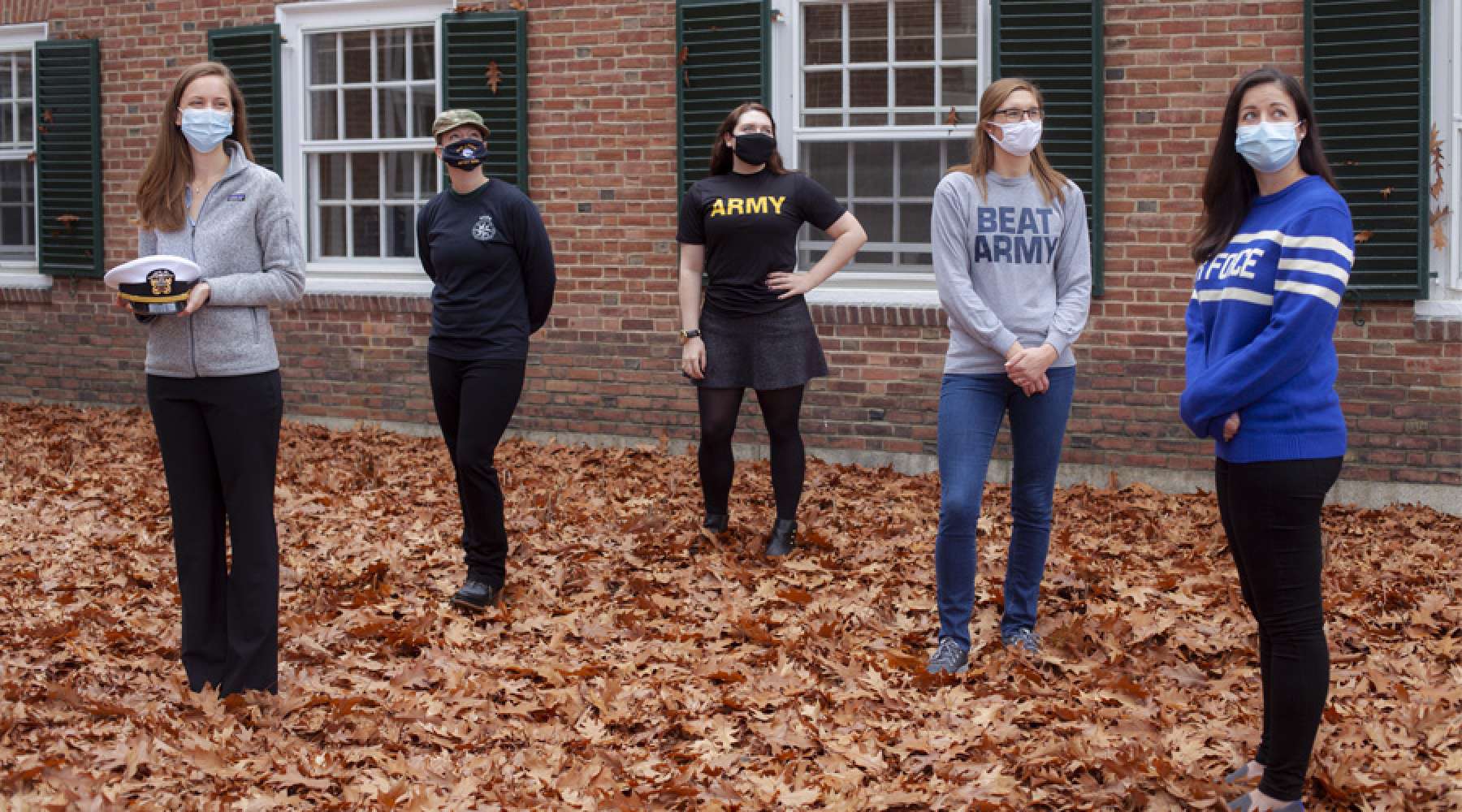
In Part II of this discussion, Wen Barker T'21 and Paul Dell’Isola T'21 explain the similarities between Tuck and the military, the inclusivity for Tuck partners, being surrounded by similarly value-driven individuals and being valued at Tuck, and more. You can find Part I of this conversation here.
Lesley: Did getting to know your classmates as you discussed change your path?
Wen: Yes, definitely. I wrote my application thinking I was going to do renewable energy and I did that, but I also feel that I took advantage of all of the resources out there. I pivoted and went on the tech track but was also given all the info sessions of GM type jobs. Tuck was really supportive with that. I was really appreciative of the fact that I didn't have to stay on some predetermined track; when I was applying, I had the perception that you had to know what you're going to do post-MBA. So I spent a lot of time on my essays, a little bit worried, frankly, because I believed in the cause, and I still do. Then I got here still thinking, “Man, I really need to know what I'm doing.” But I didn’t know and I came to see that the professors and all the staff here, and certainly the students and the alums, all treat this question very holistically and are open to allow you to learn for yourself.
Paul: Talking about the community and fast friends, I do think it's important to draw the connection to my time at the Coast Guard Academy because it’s almost the exact same size of Tuck. While you go through a pretty grueling initial period at the Academy, and Tuck is definitely not that, I realized that a lot of the things I loved about the Academy and about joining the military, I saw in my first year at Tuck. I think it's important to make those connections, that spirit and the benefit of it. For example, how close I am to my friends that I made during that period in that small environment. Making that connection that I could get that experience at Tuck was really helpful for me.
Wen: One thing I think that's been hugely helpful for me in my role as Admissions liaison is that I can say to anyone with a partner who's coming from a military background or with a family that the similarities to the military are almost uncanny. Living in Sachem Village even looks like military base housing! The whole Sachem community acts like base housing; the safety net is there and makes the transition so smooth. Earlier we talked about veterans coming right off of active duty and trying to negotiate the chasm between military and civilian existence, and now they’re getting hit by recruiting having never really interviewed before and all that comes with your first fall at b-school. Here at Tuck, you’ll know that your partner will be more than okay while you’re getting your footing and that the community around you operates very much like the military, at least the best parts. That was hugely important to me because I felt like I didn't have to really think twice about it. It was just a very natural easy transition for me, finding instant friends
Lesley: Paul, do you want to speak to this too? I'm curious what you think is the parallel in your life.
Paul: The one other thing I would add is that the level of inclusivity for Tuck partners being invited to literally everything is special and truly unique. And it's not like they’re just invited. They are invited, encouraged, and maybe even nagged to show up! There's a Tuck partner in our class band and I’ve played hockey with multiple Tuck partners on each of my teams. That's something that's really special.
Wen: Just to expand on that a little bit. The social scene here is very much characterized by the fact that you're in the middle of New Hampshire. No one has an existing social circle here so everyone's all-in on making friends. When I was applying, I was definitely looking to maximize connections and relationships for the two years, and Tuck really works hard to double down on that. Whereas in another place, especially if you're in the middle of a city, you just can't have that. That's been pretty powerful to have that mindset here.
Lesley: I feel like the military applicants who gravitate to Tuck are the ones, like you said, who are not interested in sharp elbows, people who really prefer teamwork and a feeling of shared purpose.
Paul: For me, that came through big time in the recruiting process. It was amazing to me that I never had this feeling that I'm fighting this person for this job. It was never the case. It was never a “step on you” mentality. As part of this one firm’s interview process, it was me and five other Tuckies in the room which made it so much easier because I knew that we weren’t trying to fight each other for a job. In other schools, it’s usually more hierarchical and you might have to step on someone to get ahead. That was just the opposite of the feeling I had here and it never even crossed my mind.
Wen: It definitely is funny that way. We had five of us interview for the Seattle office over at Bain and everyone was helping each other the night prior; I don't think it even occurred to us what was at stake, like, “Oh, maybe one or two are coming out of this with an offer.” You just don't really think twice about it. With our Career Services Office, you have so much more face time, if an applicant is thinking about return on investment. I just can't imagine that the proportional attention you get is greater elsewhere. When you get to Tuck, you see that they pour their heart and soul into helping us build up the alumni network out there in the real world. I super appreciate it.
paul: It's a very different energy in the room when you're going to a final round interview and you have the other Tuckie walk in, and you see that connection like you just ran into your best friend. Along these lines, I have a punch line that I tell every single applicant because I didn't get it until like 10 people in that I talked to. When you talk to anyone that's graduated from Tuck, unprompted within the first five or ten minutes of your conversation they're going to say it was the best two years of their life. That to me was really telling. You can't fake that, in my mind.
Lesley: That’s a good segue into my next question. Can you both tell me about an experience you’ve had during your time here when you just felt that Tuck synergy and you thought, “This is the place; these are my people here.”
Wen: I definitely felt that very early on and throughout the process while being here. I think a lot of vets joined the service because they have some sense of purpose, like they want to serve their country. They want to do something greater than themselves. That's generally a universal theme that underlies the rationale for joining in the first place. And yet, when you go to business school, I couldn’t help but think that for me there was a little bit of a sense that you're going to build a career and there are some not-so-great perceptions of the business world. There's a yearning for you to connect with people who similarly feel value driven and you get concerned going to business school that these people are driven by money and you hope you’re not losing your way. Then coming to Tuck you realize that there are a lot of offerings and Tuck talks about values and it is a big deal. It's a good sign that they talk about educating wise leaders to better the world of business.
Then it becomes evident when you see your classmates stepping up when COVID hit. They’re starting Hanover Helpers, they're collaborating with other schools to do pro bono consulting work for small businesses that are about to go under. People are scrambling to find opportunities to help the world in such a way that it almost made me feel a little badly for taking the chance to just think about myself for the last year and not 28 or 40 people that I had to take care of and lead in the military. You come to realize that your classmates, like everyone here at Tuck, were selected because they really fit the bill, because they're smart, they're capable, they’re accomplished. And I was a little nervous coming into it. I thought Tuck would be a good fit, but you just don't know coming in and then you see what your classmates are up to and it's pretty evident that you know this is the right place.
Paul: For me, I really enjoyed participating in the Military and Microbrews event because I realized it was the first chance for a lot of people to be educated about what we did in the military. And there was a real thirst for learning about that, a genuine interest. It really spoke to how much it mattered in having Dean Slaughter moderate, he's taking time to ask us questions about our experiences. And our classmates are there during recruiting and everything to listen. That was the first time I thought I was able to really communicate and talk about my military experience because I came in pretty nervous about rolling into a classroom talking about business type decisions that I didn't feel like I had a reason to really answer. I was a little skittish to raise my hand in the beginning and then there was a moment where I said one or two things and I realized that I do have a voice and there's a reason I'm in this room. I think it takes a little while for that to sink in, especially for me, because if you told me when I was in high school that I was going to apply to and get into any Ivy League school, I would have thought, “No chance.” I was very intimidated by going to an Ivy League school and I'm sure a lot of the other vets had the same concern.

Wen Barker T’21
Wen grew up in Cos Cob, CT and graduated from Bowdoin College with a B.A. in Mathematics in 2014. Upon graduation he commissioned into the U.S. Marine Corps and served for five years as a Logistics Officer with 2nd Battalion, 3rd Marine Regiment in Kaneohe Bay, HI. During his time with 2/3, he participated in three forward deployments to Okinawa, Japan, first as the Motor Transport Platoon Commander and later as Assistant Logistics Officer and assisted in planning support for bilateral training with regional allies across the Pacific. Wen is married to Morgan Barker of Belleville, IL and enjoys running, hiking and skiing in his free time. Summer Internship: Bain & Company, Inc.

Paul Dell’Isola T’21
Paul grew up in Bethesda, MD and graduated from the US Coast Guard Academy with a B.S. in Management in 2014. Upon commissioning, Paul joined the crew of the CGC CYPRESS (WLB 210) as a deck watch officer and law enforcement officer in Pensacola, FL. Subsequently, Paul served as the Executive Officer onboard CGC EDISTO (WPB 1313). Paul completed his final year of service working as the budget officer for 15 major cutters in the Pacific Area. In June of 2019, Paul chose to resign his commission and join Tuck to help his transition into the business world. In his free time, Paul enjoys surfing, skiing, and travel. Summer Internship: Deloitte Consulting and Patagonia